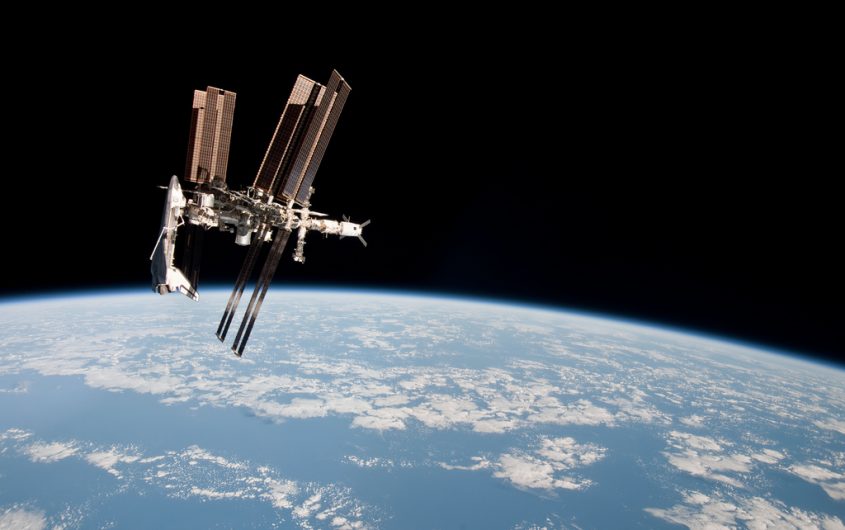
NASA via Flickr
A New Era of Transatlantic Cooperation in Space? How the New Space Economy Is Shaping the State of Affairs and What Could Be Done

Cornelius Vogt
Cornelius Vogt was an American-German Situation Room Fellow in April and May 2018.
In Germany, Mr. Vogt works as a project manager in the advanced projects department of a large defense and space company in Germany. His work focuses on issues and technologies related to space safety and security. Prior to that, he worked at the German Council on Foreign Relations (DGAP). There he took responsibility for the Task Force on International Space Policy while he also analyzed German and NATO security policy issues. Cornelius Vogt is a frequent lecturer in space security policy at the Command and Staff College of the German Armed Forces. He is a member of the "Young Leaders in Security Policy" of the Federal Academy for Security Policy.
He studied Political Science and Human Geography at the University of Potsdam, Humboldt University of Berlin, University of California Los Angeles, and Sciences Po Lille.
The space sector is undergoing profound changes. When people thought about space exploration just a decade ago, they thought about large government or international agencies such as the National Aeronautics and Space Administration (NASA) and ESA (European Space Agency) conducting the most ambitious space projects. Perceptions have changed. People have become aware and recognize that private companies aspire to do what governments used to provide.
For most of the history of the space industry (and for good reasons), space activities were driven by public funding.[1] Therefore, markets were confined to national borders, or in the case of Europe, to the borders of member countries of ESA. But the return flow of taxpayer money is not the only reason why foreign companies were mostly excluded from bidding. Space technology continues to be regarded as a strategic asset for advanced economies. Thus, major space powers prefer to procure mission critical items domestically. In contrast, today’s vast civil aviation business is commercially driven. Aircraft manufacturers are not confined to national borders. They procure aircraft parts from both sides of the Atlantic. As a result, aircraft manufacturers engage in a thriving transatlantic trade partnership. Could this be the template also for the space business?
Former U.S. president Ronald Reagan stated in 1982: “The United States Government will provide a climate conducive to expanded private sector investment and involvement in civil space activities.”[2] The political objective of privatizing and commercializing space has since been carried out by American administrations. They recognized the enormous potential of the commercial space industry a long time ago. They have fostered private space businesses over decades. And now the political objective comes to fruition.
President Donald Trump and Vice President Mike Pence take a great interest in commercial space as is illustrated with the re-establishment of the National Space Council. American government agencies are actively involving actors of the new space economy into their planning.[3] The government has been keen on making use of the evolving technological portfolio and financial resources of the private space sector. The reason for this is simple: public space budgets are under pressure, yet the ambitions for space exploration are extensive. Therefore, government agencies such as NASA, the National Reconnaissance Office (NRO), and the National Geospatial-Intelligence Agency (NGA) are trying new ways to leverage the capabilities of the private space sector. And this leverage is quite considerable. Private investors want to benefit from the vast business opportunities of space. The American space sector enjoys a powerful combination of investment companies and super wealthy individuals[4] fueling the new space economy with their funds. Space start-ups—some of which have grown to large enterprises in recent years—thrive at the interplay of smart space engineering minds and accessible investment.
There is a real concern in Europe that European space companies could find themselves on the losing end of international competition.
In Europe, on the other hand, the new space economy is much less vibrant: fewer start-ups, less private investment in space businesses, little to no dedication by individual billionaires, and less public attention and enthusiasm. European governments were—and still are—less vocal about the privatization and commercialization of space. At the same time, the European space sector—both private companies and space agencies—closely follow what the American new space economy may come up with. There is a real concern in Europe that European space companies could find themselves on the losing end of international competition. In order to stay competitive, the European space industry is restructuring itself. Companies and space agencies have raised the pressure on the research and development pipeline. The European Commission alone will increase its spending for the space program from €11.1 billion in the previous seven-year timeframe to €16 billion between 2021 and 2027. On top of that are the public space budgets of ESA and the national space agencies. Not least, the European space industry is testing new business models and invests heavily in new technologies.[5] New launcher, satellite, and payload technologies are being developed to bolster the competitiveness of the European space sector.
Europeans now see how the long-time political support for commercial space materializes in America. However, Europe cannot and should not copy the way America commercializes its space sector. What works in one country may not work in another. Instead, Europe should focus on its own strengths. Hybrid forms of privatization are not unknown to Europe. Different models of public-private partnerships have succeeded on numerous occasions. Europe needs to come up with its own coherent plan. It should act jointly and faster than in the past. Other international space players are not waiting for Europe to make up its mind and put measures in place. A coherent European space policy must not go astray by trying to satisfy the domestic industrial policies of individual countries. Instead, European space policy should focus rigorously on achieving higher levels of economic competitiveness and conducting space missions that generate real added value.
European space policy should focus rigorously on achieving higher levels of economic competitiveness and conducting space missions that generate real added value.
Transatlantic competition is taking place against the backdrop of an ever-increasing international space competition that involves Russia, China, Japan, and a quickly growing number of smaller but not any less committed space powers such as South Korea and India. However, transatlantic space affairs are not only characterized by competition. There are many examples of transatlantic space cooperation—in the past, the present, and envisioned for the future.[6] Most of these examples are scientific space exploration projects. There is little reason to believe that institutional cooperation between space agencies will be foregone in the future as both sides have greatly benefitted from it in the past. It rather provides a solid foundation of shared experiences and trust on which a more commercial cooperation framework can build on. In the face of shared challenges and the plentiful examples of successful cooperation, there is a strong case for America and Europe to cooperate and make it a common endeavor to create an innovation-enabling and commercially-permissive space business environment. This would involve reviewing the existing tight export control regulations. They are far more than just a nuisance for fast-paced new space entrepreneurs. The “good old” transatlantic space science projects of large agencies feel the heavy burden, too. While in place with good intentions, the current export control regime constitutes a serious barrier to transatlantic space cooperation. Instead, export regulations should strike the balance between legitimate national security concerns and the necessities of commercial exchange across borders. At the very least, export restrictions for specific technologies should be reviewed more frequently than in the past, especially as technology evolves at a much higher rate these days. What is deemed exclusive technology today may quickly be outperformed by tomorrow’s inventions. Whether export restrictions will substantially be relieved in the near term remains disputable. There is real tension between public security requirements versus private business objectives. A solution needs to be found.
President Trump announced on June 18, 2018, the creation of the Space Force as the sixth branch of the U.S. armed forces. Space assets have become a key enabler for any modern warfare. The American military prepares for wars that are being fought in space (and so do Russia and China). This evolution has consequences for commercial space too. Commercial space depends on a peaceful space environment more than anything. Any war that extends into space would dramatically decrease the prospects for space usage for commercial purposes.
Any war that extends into space would dramatically decrease the prospects for space usage for commercial purposes.
The space business is changing in many ways. Space is no longer the domain of a few technologically advanced players such as America, Europe, Russia, or China. Dozens of countries now own their own satellites. Additionally, the number of non-government satellite owners and operators is growing fast. This includes private businesses and academia. Some of the commercial players plan to launch mega-constellations of several hundred or even several thousand satellites.[7]
As the number of satellites in orbit rises and the space debris situation worsens, the need for space traffic management grows. The evolving space traffic management needs to look beyond the existing and rather rudimentary international regime of rules that was instated in the early days of the space age by only a few space powers. The regulatory regime for commercial space activities is quickly evolving as it has never done before. Several countries have passed domestic space laws—often with the intention to spur investment and growth in the commercial space sector. While this is to be welcomed by and large, a fragmented legal landscape also generates a need for international harmonization of rules and procedures. It is commonplace for aeronautics rules to be internationally harmonized due to the international nature of air traffic. Space traffic, however, is more global than anything. Rules—for example on the mitigation of space debris—need to be globally accepted and implemented in order to be effective. The transatlantic community should pioneer the development of a common framework for space traffic regulation. As a first—and much needed—step, Europeans should gather and discuss how the scattered regulatory environment in Europe can be aligned. A more coherent framework would allow Europeans to speak with one voice vis-à-vis international partners.
The transatlantic community should pioneer the development of a common framework for space traffic regulation.
Americans and Europeans have a lot to gain if they can fully exploit the potential of the new space economy: quicker innovation cycles, lower costs, versatile fulfillment of market demands, project risks shared among public agencies and private corporations, improved competitiveness vis-à-vis emerging space powers. It will require a common transatlantic political approach to make this happen.
[1] Satellite communications was commercialized on a large scale many years ago. Nonetheless, government users, e.g., the military, remain one of the largest customers for satcom bandwidth.
[2] National Security Decision Directive Number 42, “National Space Policy,” July 4, 1982.
[3] See for example speech delivered by NRO Director Betty Sapp on April 17, 2018, at the 34th Space Symposium in Colorado Springs: “Commercial space will be fully leveraged in satisfying user needs and fully considered in the development of every future space system […] we want to design only what we must and buy everything that we can.”
[4] Examples of billionaires who have heavily invested in the private space sector include Jeff Bezos, Richard Branson, Elon Musk, and Paul Gardner Allen.
[5] Examples include investments in commercial services on the ISS, on-orbit satellite servicing, commercial Earth observation services, new launcher technologies, space situational awareness services and infrastructures. Moreover, the large European space companies are actively searching for investment opportunities in new space start-ups around the world.
[6] Examples include: James Webb Space Telescope, Cassini/Huygens, GRACE and GRACE Follow-On, several Spacelab missions, the International Space Station, and GPS-Galileo compatibility.
[7] Satellite mega-constellations include for example the broadband constellations OneWeb with roughly 900 satellites and Starlink with several thousand satellites.








